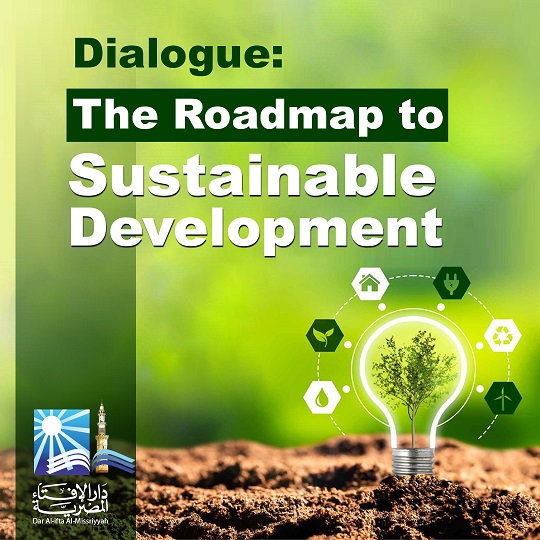Dialogue: The Roadmap to Sustainable Development

Ibn Khaldun—the Arab philosopher, sociologist and historian—described man as a social being by nature. This makes dialogue an essential part of our daily life. And to define life, Prophet Muhammad (peace and blessings be upon him) left us the roadmap in a few genuine words. He (pbuh) advised, “Whoever among you wakes up in the morning healthy in his body, secure in his house (or his family), and has his day’s provision, it is as though the world has been brought into his possession” (At-Tirmidhi).
After more than 1400 years, the Prophet’s words have become the world’s agenda in our time as to address what is called “Sustainable Development Goals” SDGs.
As social beings, interaction, dialogue and cooperation are the pillars of building civilizations and bridges of communication with the other. The aforementioned prophetic tradition prescribed the three main elements of a good life; namely, good health, safety and provision (food and water). These are God-given gifts that should not be belittled; they provide the force that enables the mind to think and create, and the body to work and produce.
To this effect, the concept of “sustainability” has been the talk of the world over the past ten years in an attempt to preserve “human life” in a time plagued with economic, social and political challenges. The challenges occupy the agenda of the 2030 that aims to achieving sustainable development goals. These goals can be summed up as “Preserving Man’s Dignity”. Therefore, the Prophet’s advice is a key to sustainability provided we manage to address its elements in a good way.
This takes us to the second level of sustainability which is “Dialogue”. We can never realize the value of this advice except when we understand the influence a series dialogue can make in this respect. The Quran is clear that "God has honored the children of Adam." Islam therefore makes no distinction among races, ethnicities, or religions in its belief that all people are deserving of basic human dignity. Furthermore, Islam has laid down justice, peace and cooperation as the basic principles of interaction among religious communities.
A dialogue among people of different faiths is ultimately relevant to the Prophet’s advice that covers the following main three pillars of a good life with a view to maintain “sustainability”.
Good Health and Well-Being
This is the third out of the seventeen goals of sustainable development. The Prophet said, “Whoever among you wakes up in the morning healthy in his body…”, hence, this is a precious gift that deserves to thank God for, and it is the first form of dialogue man can have with His Lord.
Thanking God for the bounties He bestows on us, without asking for them, is a great blessing “'If you are grateful, I will certainly give you more” (Quran 14: 7). This means that thanking and gratefulness is a means for preserving blessings and good health tops the list.
A Safe Residence “Family”
Reading statistics on the displaced people worldwide can make a person who holds their smart phone and scroll down the news feed while leaning on a cozy sofa realize the priceless value of having a safe “home” and a healthy family. “Sustainable cities and communities” is the 11th goal of sustainable development that comes in line with this Prophetic advice. To this effect, it is the duty of each parent to talk to their dependents on the importance of appreciating the blessing of safety, shelter and “home” whatsoever big or small it is.
Provision
Food, water and air are the three main essential sources of provision that man cannot do without. According to the sustainable development goals, ending poverty and providing clear water are from among the most important fundamental goals that man in our times need. In Islam, sharing food is a source of bringing people close together and promoting peace. The Prophet (peace and blessing be upon him) said: “He is not a believer whose stomach is filled while his neighbor goes hungry” (Tabarani). God Almighty says, “And give food” (Quran 76: 8). The sun, moon, air, mountains and the entire universe have been subjected to man by the will of the Creator, this is the first lesson that everyone should know. The nature was created in honor of man.
Dialogue Starts from the Family
Someone might ask: How can dialogue contribute to preserving theses blessings?
The family is the first institution where a child grows and learns. It is the beginning of the thread, if parents understand this. The Prophet (peace and blessings be upon him) said, “You are all care takers and responsible for your dependents”. Therefore, the dialogue we need stresses the need to link all fields of development that make man the center of this talk and development project. This includes giving particular attention to the child’s intellect, education, health, environment and so forth.
 Arabic
Arabic French
French Deutsch
Deutsch Urdu
Urdu Pashto
Pashto Swahili
Swahili Hausa
Hausa
